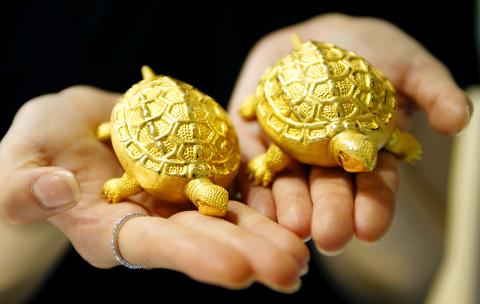South Korea spent more than US$1 billion in its first gold purchase in more than a decade, as uncertainty about global growth and sovereign debt push central banks around the world to diversify foreign reserves.
A brittle global economic recovery and precarious debt conditions in the US and Europe have boosted the safe-haven appeal of gold, lifting the bullion to a record high on Friday.
The Bank of Korea said in a statement yesterday it bought 25 tonnes of gold over the past two months, raising its gold holdings to 39.4 tonnes, news that helped lift spot gold by about US$6 from late Monday.

Photo: Reuters
Reserve currencies, like the US dollar and euro, “have been losing their clout since the recent global financial crisis partly due to abnormal monetary policy adopted in many countries and fiscal deficit problems,” said a central bank official who declined to be named because he was not authorized to speak to the media.
Data on 27 major economies from the Bank for International Settlements shows the US dollar’s inflation-adjusted real effective value has dropped by 10 percent in the past two years and the euro has lost 6 percent, reflecting the sharp increase in the amount of each currency in circulation.
South Korea’s gold holdings remain far smaller than that of other Asian central banks, with China, which ranks sixth globally, the biggest with 1,054.1 tonnes by the end of May, according to World Gold Council data.
Japan, No. 9 globally, has 765.2 tonnes of gold, or 3.3 percent of its total reserves, and 11th-ranked India has 557.7 tonnes, or 8.7 percent.
With prices hovering near historic highs, the central bank of Asia’s fourth-largest economy said gold looked less lucrative as an investment, but it was the right time to buy the precious metal because its foreign reserves had risen above US$300 billion.
The news helped boost gold prices, with spot up 0.4 percent at US$1,623.94 an ounce at 5:28am. Gold hit a record high of US$1,632.30 on Friday.
“Any news about central banks buying gold reassures consumers and other major players who are already looking at gold as an investment,” said Jeffrey Pritchard, an analyst at California-based commodities futures and options brokerage Altavest Worldwide Trading.
The increased gold holding would put South Korea in 45th position in the World Gold Council’s list of central banks holding gold, up from 56th previously, the Bank of Korea said.
The US has the biggest gold holding in its reserves, at 8,133.5 tonnes, or 74.7 percent of total reserves, according to the council’s report last month. Germany is a distant second with 3,401 tonnes, or 71.7 percent of its total reserves.

MULTIFACETED: A task force has analyzed possible scenarios and created responses to assist domestic industries in dealing with US tariffs, the economics minister said The Executive Yuan is tomorrow to announce countermeasures to US President Donald Trump’s planned reciprocal tariffs, although the details of the plan would not be made public until Monday next week, Minister of Economic Affairs J.W. Kuo (郭智輝) said yesterday. The Cabinet established an economic and trade task force in November last year to deal with US trade and tariff related issues, Kuo told reporters outside the legislature in Taipei. The task force has been analyzing and evaluating all kinds of scenarios to identify suitable responses and determine how best to assist domestic industries in managing the effects of Trump’s tariffs, he

TIGHT-LIPPED: UMC said it had no merger plans at the moment, after Nikkei Asia reported that the firm and GlobalFoundries were considering restarting merger talks United Microelectronics Corp (UMC, 聯電), the world’s No. 4 contract chipmaker, yesterday launched a new US$5 billion 12-inch chip factory in Singapore as part of its latest effort to diversify its manufacturing footprint amid growing geopolitical risks. The new factory, adjacent to UMC’s existing Singapore fab in the Pasir Res Wafer Fab Park, is scheduled to enter volume production next year, utilizing mature 22-nanometer and 28-nanometer process technologies, UMC said in a statement. The company plans to invest US$5 billion during the first phase of the new fab, which would have an installed capacity of 30,000 12-inch wafers per month, it said. The

Taiwan’s official purchasing managers’ index (PMI) last month rose 0.2 percentage points to 54.2, in a second consecutive month of expansion, thanks to front-loading demand intended to avoid potential US tariff hikes, the Chung-Hua Institution for Economic Research (CIER, 中華經濟研究院) said yesterday. While short-term demand appeared robust, uncertainties rose due to US President Donald Trump’s unpredictable trade policy, CIER president Lien Hsien-ming (連賢明) told a news conference in Taipei. Taiwan’s economy this year would be characterized by high-level fluctuations and the volatility would be wilder than most expect, Lien said Demand for electronics, particularly semiconductors, continues to benefit from US technology giants’ effort

‘SWASTICAR’: Tesla CEO Elon Musk’s close association with Donald Trump has prompted opponents to brand him a ‘Nazi’ and resulted in a dramatic drop in sales Demonstrators descended on Tesla Inc dealerships across the US, and in Europe and Canada on Saturday to protest company chief Elon Musk, who has amassed extraordinary power as a top adviser to US President Donald Trump. Waving signs with messages such as “Musk is stealing our money” and “Reclaim our country,” the protests largely took place peacefully following fiery episodes of vandalism on Tesla vehicles, dealerships and other facilities in recent weeks that US officials have denounced as terrorism. Hundreds rallied on Saturday outside the Tesla dealership in Manhattan. Some blasted Musk, the world’s richest man, while others demanded the shuttering of his